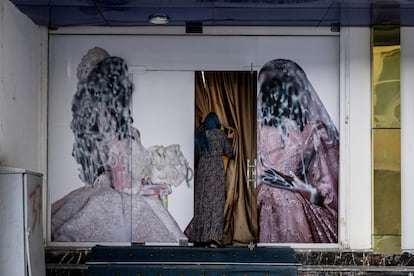Taliban shut down women’s hairdressers and beauty salons in Afghanistan
The fundamentalists will cancel the licenses of these businesses, one of the last strongholds of work and socialization for Afghan women


One of the last places where Afghan women could earn a living and meet each other to talk and get out of the house are to close their doors across the country by July 25 under a direct order from the Taliban’s supreme leader, Mullah Haibatullah Ajundzadah. The order to revoke the licenses of hairdressing and beauty salons was given in a statement issued Sunday by the Taliban Ministry of Propagation of Virtue and Prevention of Vice, which was reported Tuesday by the Afghan daily Hasht-E Subh Daily. In a country where, with few exceptions, the Taliban had already banned women from working, this measure deprives several thousand more Afghan women and their families of their livelihood. There are no figures on how many such establishments there are in the country, but the Afghan press and activists consulted by EL PAÍS estimate the number to be between more than 1,000 and several thousand.
“Unfortunately, this news is true, and the beauty salons have already been shut down,” Laila Basim, one of the founders of the Coalition of Afghan Women Protest Movement, confirms via WhatsApp from Kabul. “There are more than a thousand hair salons all across the country and each of these women’s salons employs between five and six people. This means thousands more women will be out of work.”
The Taliban’s communiqué reporting the revocation of the licenses does not provide any reason for their closure. Mohammad Sadeq Akif Muhajir, spokesman for the Ministry for the Prevention of Vice, assured Agence France Presse on Tuesday: “Once the businesses are closed, we will explain the reason to the media.” During their previous period in power, between 1996 and 2001, the Taliban also closed this type of establishment which, in Afghanistan, maintains a strict segregation of the sexes.
“Gender apartheid”
Since the fundamentalists regained power on August 15, 2021, women and girls in Afghanistan have been progressively deprived of the rights they had acquired during the 20 years of international military presence in the country. The fundamentalists have passed dozens of decrees to this end, the ultimate aim of which, Basim stresses, is “to remove Afghan women from all areas of society.”
Afghan women are forbidden to study from the age of 12 and to work in administration, security forces, banks, NGOs and the United Nations. Women are also not allowed to obtain a passport or travel without being accompanied by a close male relative. Recreational activities are also forbidden. In addition to the general ban on listening to music, Afghan women are no longer allowed to enter parks, gardens and gyms. Nor can they use public restrooms. Five out of 10 Afghans do not have access to basic sanitation facilities, according to UNICEF data. For many women and girls, these baths were the only way to wash themselves with hot water and to have proper hygiene during their periods.
On June 20, a team of United Nations experts presented a report on the persecution of Afghan women, defining what Afghan women and girls experience as “gender apartheid,” which can be considered a “crime against humanity.” The text highlights one aspect: attempts at complete “domination” of women, “severe, systematic and institutionalized” discrimination and the “controlling environment” that prevents women and girls from leaving the house.
“The Taliban are enemies of women and this [the closure of these businesses] is not the last measure against them, nor will it be. By repressing women, what the Taliban want is to use Afghan women to blackmail the international community into recognizing them [as the legitimate government of Afghanistan],” says Laila Basim, referring to the Taliban’s efforts to convince the international community to recognize their legitimacy in exchange for moderating their anti-women policies.
Mental health
Ariana also responds by WhatsApp from Kabul with her voice muffled. Until the fundamentalists returned to power, this 19-year-old, who hides her identity under a false name, was studying at the American University of Kabul. Unable to continue her education, she spends her time sharing her English skills with other Afghan teenage girls, whom she teaches via a platform. Ariana believes that the closure of hairdressing salons is intended to “prevent women from leaving the house,” but agrees with Basim that the most serious consequence of this measure will be the loss of several thousand women’s jobs.
“My neighbor’s father is unemployed, and the family subsisted on the work of the mother, who is a dressmaker, and the daughters worked in beauty salons. But it’s not just about my neighbor. Thousands of women work in these businesses, especially after the collapse of the government [of president Ashraf Ghani, overthrown by the Taliban], because many women became unemployed and had no alternative but to work outside the home in these hairdressing salons and beauty salons,” says the young woman. She confesses that every day she has to “fight with herself” to keep from getting discouraged.
Of the 2,000 Afghan women interviewed by the U.N. Panel of Experts for its report on gender apartheid in Afghanistan, half reported knowing at least one woman or girl who had suffered anxiety or depression since the fundamentalists returned to power. “Deteriorating mental health is a serious concern for all the women we talk to,” the experts stressed.
“I’m almost always at home, I may go out once a week and sometimes not even that: I have no reason to go out. I work a lot through the internet and many friends my age do the same. This is very, very hard. Sometimes I feel that not being physically active, not meeting people, not being able to meet with anyone makes me feel like I’m going crazy,” says Ariana.
Parasto Hakim, a girls’ education rights activist in Afghanistan speaking from an undisclosed location for security reasons, asks, alluding to the Taliban, “What can you expect from a terrorist group?” “Do any terrorists like beauty? All they want to do is destroy.”
Sign up for our weekly newsletter to get more English-language news coverage from EL PAÍS USA Edition
Tu suscripción se está usando en otro dispositivo
¿Quieres añadir otro usuario a tu suscripción?
Si continúas leyendo en este dispositivo, no se podrá leer en el otro.
FlechaTu suscripción se está usando en otro dispositivo y solo puedes acceder a EL PAÍS desde un dispositivo a la vez.
Si quieres compartir tu cuenta, cambia tu suscripción a la modalidad Premium, así podrás añadir otro usuario. Cada uno accederá con su propia cuenta de email, lo que os permitirá personalizar vuestra experiencia en EL PAÍS.
¿Tienes una suscripción de empresa? Accede aquí para contratar más cuentas.
En el caso de no saber quién está usando tu cuenta, te recomendamos cambiar tu contraseña aquí.
Si decides continuar compartiendo tu cuenta, este mensaje se mostrará en tu dispositivo y en el de la otra persona que está usando tu cuenta de forma indefinida, afectando a tu experiencia de lectura. Puedes consultar aquí los términos y condiciones de la suscripción digital.








































